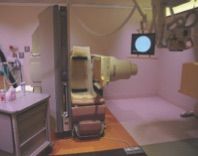What Is a Videofluoroscopic Swallow Study?
A videofluoroscopic swallow study (VFSS) is a video X-ray exam of the mouth and throat performed while a person eats and drinks. It’s also called a modified barium swallow test.
Your child sits in a feeding chair or an adaptive seat. We give your child some food mixed with a solution containing barium, which helps us more easily see the food’s movement in the X-ray images. Depending on your child’s age, the food we give might be a liquid; pudding or some other soft solid; or a hard solid. Radiologists (doctors who specialize in imaging tests) and radiology practitioner assistants (RPAs) conduct the VFSS in the Imaging department with the help of speech and language pathologists and radiologic technologists.
We do a VFSS to check for problems with swallowing that might cause difficulty with breathing, eating or drinking.
We conduct videofluoroscopic swallow studies in our Imaging department. While your child sits in a special seat, a video X-ray camera tracks how food moves through the body during eating and drinking.

- Your child shouldn’t skip any meals beforehand, but should be hungry at the time of the study.
- Do not skip any scheduled medicines.
- Bring:
- Small amounts of food/drink that your child swallows easily and willingly
- Small amounts of food/drink that your child has trouble swallowing
- Some of your child’s favorite foods
- Any of your child’s familiar or favorite feeding tools, including spoons, sippy cups, bottles, etc.
Videofluoroscopy uses radiation, so a patient who’s pregnant or who believes she might be pregnant should talk to her doctor before undergoing a VFSS. Information shared with the doctor is confidential. In addition, parents or caregivers who are pregnant or who believe they might be pregnant shouldn’t be in the room during the exam.
The test itself takes less than 15 minutes. The entire appointment takes about 60 minutes and includes:
- Meeting with the speech and language pathologist (SLP) The SLP asks about your child’s swallowing problems and answers your questions about videofluoroscopy. The SLP stays with your child throughout the appointment.
- Getting into position When it’s time for the scan, your child sits in a special chair. We place a seatbelt over the waist for safety. When possible, we place a protective cover over the parts of the body that don’t need testing. Our process allows for a thorough, accurate test while exposing patients to the smallest amount of radiation necessary.
- Preparing foods and drinks The SLP mixes the barium into the foods and liquids we’ll give your child. During the test, the SLP might try several types of food and feeding utensils, such as cups, bottles, straws or syringes, to help your child swallow more easily.
- Taking X-rays As your child eats and drinks, the radiologist or RPA records the eating and swallowing movements with a special X-ray video camera. The camera comes near — but doesn’t touch — your child’s body. A VFSS does not hurt.
- We encourage the child’s parents or caregivers to stay in the exam room. Your child’s community feeding therapist, such as an SLP or an occupational therapist, is also welcome to attend the appointment.
- The most important thing you can do is help your child stay calm. To do this, try to stay calm yourself.
- Talk positively about the food and drink used during the test. This will encourage your child to try them.
The SLP will meet with you and your child to discuss the VFSS results and explain our recommendations. For example, we might advise you to work with your health care team to develop a feeding plan.
- Your child can return to normal activities.
- Give your child extra fluids to help the barium pass more easily.
- The barium will cause white bowel movements for a day or two after the test. Some patients also experience constipation (hard stool or difficulty passing stool). Mild laxatives can help relieve this.
- If the constipation continues or becomes an ongoing problem, please contact your child’s primary care doctor.
For More Information
For more information about imaging tests at Gillette, please call the Advanced Imaging Center at 651-229-3995.
This information is for educational purposes only. It is not intended to replace the advice of your health care providers. If you have any questions, talk with your doctor or others on your health care team. If you are a Gillette patient with urgent questions or concerns, please contact Telehealth Nursing at 651-229-3890.
This information is for educational purposes only. It is not intended to replace the advice of your health care providers. If you have any questions, talk with your doctor or others on your health care team.
If you are a Gillette patient with urgent questions or concerns, please contact Telehealth Nursing at 651-229-3890.
 Home Page
Home Page


